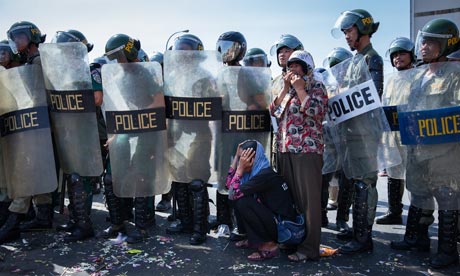Cambodian 'housewives' have led a sustained campaign of nonviolent protest against forced evictions

The mother of land
rights activist Yorn Bopha cries in front of a line of riot police
barricade on hearing her daughter was sentenced to three years in jail.
Photograph: Erika Pineros/Demotix/Corbis
Designer Diane von Fürstenberg will today present the Vital Voices leadership in public life award to Tep Vanny,
a self-branded housewife who has become a guiding light in Cambodia's
battle against forced evictions. Carried out in the name of progress,
forced evictions now rank as one of the world's most serious human
rights abuses. Amnesty International defines them
as "when people are forced out of their homes and off their land
against their will, with little notice or none at all, often with the
threat or use of violence". And in Cambodia, a country devastated by the
pursuit of profit, it is housewives who have come out fighting against
them.
In 2007, the Chinese-backed private development
company Shukaku Inc was granted a 99-year lease to build on and around
Boeung Kak lake in central Phnom Penh. The company went on to fill the lake with sand, destroying approximately 10,000 residents' homes and submerging their lives with it. Even more homes are under threat. One community member told me
the government was "trying to eradicate poverty by displacing the poor
from the city where they can hide our poverty. This is what they mean by
poverty eradication. They don't care how we will survive, if we live or
die. They ruin our homes, our incomes, we are left with absolutely
nothing."
Western feminists should not lose sight of the
fact that in many countries around the world, women's role as wife and
mother remains central to their family and societal status. When homes
are threatened with destruction, it is women who are disproportionately
affected. While women are commonly framed as defenceless "soft targets"
in forced evictions, Vanny and her fellow housewives complicate this
assumption. Harnessing softness as a strategy rather than a hindrance,
these women have committed themselves to a sustained campaign of
nonviolent protest. Worried that involving men would only encourage
violence, "turning men into goldfish clashing with each other", they are
using their positions as wives and mothers to co-opt riot police
through their songs of suffering and to morally shame them when they are
publicly beaten.
In contrast to British stereotypes of the
inward-looking housewife, these women are committed and
forward-thinking political activists. Their influence extends far beyond
the homes they care for. Wearing a T-shirt emblazoned with the slogan
"The Whole World is Watching", one of the women explained that with
guidance from NGOs, the group's members have become experts at building a
spectacle courted by the international media. Exposing their bare
breasts outside the Cambodian parliament, they aimed to demonstrate the
vulnerability of being left only with their bodies. And donning birds'
nests complete with chicks on their heads, they came out in defence of
their role as mother hens.
Not content with these national
displays of resistance, the housewives took a lead role in submitting a
complaint to the World Bank, insisting that it had breached its
operational policies. The World Bank admitted that its land titling project had contributed to the harms suffered, and suspended its loans to Cambodia. The housewives of Boeung Kak
are playing a critical leadership role in publicly contesting
large-scale losses of homes that are being felt in communities sadly too
numerous to name. In taking on this extra burden, housewives in
Cambodia have become domestic goddesses battling global problems.
So
what does this mean for British women? While forced evictions are rare
in this country, the courage of the Boeung Kak women is not without
precedent in the UK. We only need to think back to Greenham Common in the 1980s
for an example of housewife activists who fought to protect their
families against the feared instalment of nuclear weapons in southern
England. Both sets of women, whether in Cambodia or Britain, show the
power that housewives can wield, of illuminating injustices at the
highest of political levels.
Vanny and the women of Boeung
Kak may not have won the geopolitical battle against forced evictions in
Cambodia, but they have shown that housewives should not be slated, but
rewarded, for their inspirational dedication to domestic life.


1 comment:
New direction is now needed for Khmer women :
" Khmer women should not be confined to the
House, they should also be in the Senate "
Khmer Girl
Post a Comment